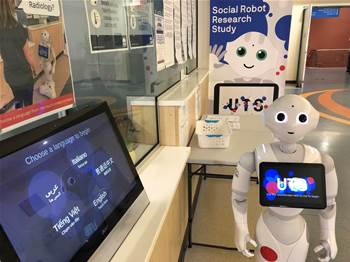Fairfield Hospital in southwest Sydney has introduced a wayfinding robot to make visits to greet patients and visitors and help anxieties and wait times.
Fairfield was chosen to trial the Pepper humanoid robot for the Southwestern Sydney Local Health District and University of Technology Sydney because it falls in one of Australia’s most culturally and linguistically diverse areas, hospital general manager Paul Crowe said.
“The robot is extra-special because it converses in five prevalent languages in south western Sydney – English, Mandarin, Arabic, Vietnamese and Italian,’’ Crowe said.
Pepper, from Softbank Robotics, was programmed with 500,000 lines of code at the University of Technology Sydney’s Magic Lab Centre of Artificial Intelligence to tailor it to Fairfield’s needs and use neural networks for multi-lingual speech analysis.
Distinguished Professor Mary-Williams, director of the Magic Lab, said that even though a kiosk could also offer the same information, a social humanoid robot was chosen because it has a face.
“Social robots are fairly new but a big differentiator between them and other technologies is their face and body, which can adapt to social behaviours,” Williams told iTnews.
Some of those social behaviours, such as turning and pointing when giving directions, help people understand and retain directions better, Williams said.
And unlike a human working in a dedicated wayfinding capacity, which would be more expensive, the Pepper bot’s screen can instantly display digital maps or videos of where to go along with verbal and gestural instructions.
Other behaviours reflect humans’ innate bias in finding faces.
“The recognition of the face is almost unconscious - we have a dedicated part of the brain for that and it happens pretty much instantly.”
That has a big impact on how people interact with technology, and UTS’ research has shown that under the right circumstances people trust social robots more than humans and will offer up more information.
Crowe said the trial definitely supports that research.
“Our patients and visitors have been amazed to see a robot in our foyer. It’s been a real success – the robot is happy and friendly and everyone loves it.’’
Part of that success is, ironically, because robots don’t make unconscious decisions the way humans do.
“A robot isn’t going to judge you when you turn up to hospital because you’re a woman or you’re from a different background or not looking your best. If I normally look quite professional but have to rush to the hospital after doing some gardening, the robot isn’t going to treat me any differently because I don’t look as nice,” Williams said.
In a diverse community like Fairfield, removing that layer of anxiety about being treated differently because of appearance or language barriers helps visitors to the hospital have a better experience.
The multilingual robot also helps ensure people get sent to the right place to get the care they need.
“The security guards told us that sometimes people would just come up to them with a note somebody else had written for them in English trying to explain what was wrong, and the person wouldn’t even know what it said.
“These robots can respond to people in their own language, or show what the person is saying in their language on a screen and translate to English so that everyone knows what’s being said.”
The benefits of this aren’t just social - delayed and missed appointments due to getting lost in the hospital add up.
“We worked with Fairfield to find out what the processes could be improved and found this was the number one pain point, forgive the pun.”
Robots also have the added benefit in that they can’t transmit disease, Williams added.
“We had one kid run up and hug the robot because he was so excited, all we had to do was wipe it down with alcohol and it was good to go in case the next kid to come up decided to hug it too.”


























